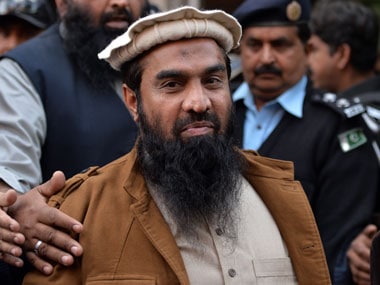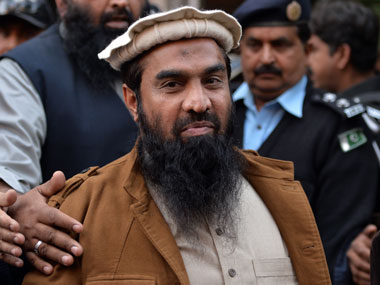India has sought the United Nations’ intervention over the issue of LeT commander Zaki-ur Rehman Lakhvi’s release from jail. But is it a sound move by India considering the fact that India has for decades consistently opposed involvement of non-regional powers and intervention of ‘third parties’ in its bilateral dispute with Pakistan? An even larger question is this: hasn’t the Modi government with this move reversed India’s Pakistan policy as far as the issue of third parties’ involvement in India-Pakistan dispute is concerned? It is a historical fact that India and Pakistan have been at two opposite ends of the spectrum on the role of third parties in their bilateral dispute. In fact, it has been Pakistan that has been seeking at the drop of a hat the intervention of third parties like the UN, the United States and even China but India has summarily rejected Pakistan’s moves in this context. [caption id=“attachment_2224366” align=“alignleft” width=“380”]
 Lakhvi. AFP.[/caption] By seeking the UN intervention in the matter of Lakhvi hasn’t India played in the hands of Pakistan? The news development can be summarized as follows. India’s Permanent Representative to the UN Asoke Mukherjee has written a letter to the current Chair of the UN Sanctions Committee Jim McLay and pointed out that Lakhvi’s release by a Pakistani court on 9 April was in violation of UN Resolution number 1267 which deals with designated entities and individuals. The Indian envoy has also mentioned that even the bail amount provided was against the sanctions’ committee rule which calls for freezing the funds and other financial assets or economic resources of designated individuals and entities. More about the UN Resolution 1267 can be read
here
. While there can be no dispute that the Indian envoy’s objection to Lakhvi’s release is a relevant point. His questioning of the source of money for Lakhvi for furnishing the bail bond considering that his and his outfit’s funding and financial resources are supposed to be frozen is even more hard-hitting and valid. The issue here is not whether India is raising valid points. The issue is where this issue is being raised? Is India barking up the wrong tree? If it isn’t, is this move in sync with India’s decades-old Pakistan policy in terms of third party involvement? The move appears to be all the more baffling as the BJP has consistently castigated India’s first Prime Minister Jawaharlal Nehru, one of the tallest leaders of the Congress, for approaching the UN over the issue of Kashmir decades ago. A possible justification of the Narendra Modi government’s move can be that it is a wise move because the UN has always stood with anti-terror policies. Therefore, the UN is the right forum for taking up the Lakhvi issue! However, this writer cannot see in which way the above move can help India. On the contrary, it will give a handle to Pakistan in all future scenarios as this is precisely what the Pakistan government has been asking for and India has been opposing: intervention of the UN or any other third party in bilateral issues between India and Pakistan. It will be equally interesting to know how many times and against how many Pakistan-based terrorists has India moved the UN invoking UN resolution 1267. Three most important points about UN Resolution 1267 are as follows: - Assets Freeze: freeze without delay the funds and other financial assets or economic resources of designated individuals and entities. - Travel Ban: prevent the entry into or transit through their territories by designated individuals. - Arms Embargo: prevent the direct or indirect supply, sale and transfer from their territories or by their nationals outside their territories, or using their flag vessels or aircraft, of arms and related materiel of all types, spare parts, and technical advice, assistance, or training related to military activities, to designated individuals and entities. This UN resolution is high on rhetoric but low on deliverability. The truth is that since it was adopted by the UN well over fifteen years ago precious little has been achieved under this rubric by the international community. But this is a highly complicated issue. As I said before the facts of the case presented by India are unquestionable. The question is whether knocking the UN door over the Lakhvi issue doesn’t turn the decades-old India’s Pakistan policy on its head? Here is one more question. Won’t it have been a better approach for India to invoke UN Resolution 1267 per se against Pakistan in a more general way rather than seeking UN intervention in the particular case of Lakhvi?
Lakhvi. AFP.[/caption] By seeking the UN intervention in the matter of Lakhvi hasn’t India played in the hands of Pakistan? The news development can be summarized as follows. India’s Permanent Representative to the UN Asoke Mukherjee has written a letter to the current Chair of the UN Sanctions Committee Jim McLay and pointed out that Lakhvi’s release by a Pakistani court on 9 April was in violation of UN Resolution number 1267 which deals with designated entities and individuals. The Indian envoy has also mentioned that even the bail amount provided was against the sanctions’ committee rule which calls for freezing the funds and other financial assets or economic resources of designated individuals and entities. More about the UN Resolution 1267 can be read
here
. While there can be no dispute that the Indian envoy’s objection to Lakhvi’s release is a relevant point. His questioning of the source of money for Lakhvi for furnishing the bail bond considering that his and his outfit’s funding and financial resources are supposed to be frozen is even more hard-hitting and valid. The issue here is not whether India is raising valid points. The issue is where this issue is being raised? Is India barking up the wrong tree? If it isn’t, is this move in sync with India’s decades-old Pakistan policy in terms of third party involvement? The move appears to be all the more baffling as the BJP has consistently castigated India’s first Prime Minister Jawaharlal Nehru, one of the tallest leaders of the Congress, for approaching the UN over the issue of Kashmir decades ago. A possible justification of the Narendra Modi government’s move can be that it is a wise move because the UN has always stood with anti-terror policies. Therefore, the UN is the right forum for taking up the Lakhvi issue! However, this writer cannot see in which way the above move can help India. On the contrary, it will give a handle to Pakistan in all future scenarios as this is precisely what the Pakistan government has been asking for and India has been opposing: intervention of the UN or any other third party in bilateral issues between India and Pakistan. It will be equally interesting to know how many times and against how many Pakistan-based terrorists has India moved the UN invoking UN resolution 1267. Three most important points about UN Resolution 1267 are as follows: - Assets Freeze: freeze without delay the funds and other financial assets or economic resources of designated individuals and entities. - Travel Ban: prevent the entry into or transit through their territories by designated individuals. - Arms Embargo: prevent the direct or indirect supply, sale and transfer from their territories or by their nationals outside their territories, or using their flag vessels or aircraft, of arms and related materiel of all types, spare parts, and technical advice, assistance, or training related to military activities, to designated individuals and entities. This UN resolution is high on rhetoric but low on deliverability. The truth is that since it was adopted by the UN well over fifteen years ago precious little has been achieved under this rubric by the international community. But this is a highly complicated issue. As I said before the facts of the case presented by India are unquestionable. The question is whether knocking the UN door over the Lakhvi issue doesn’t turn the decades-old India’s Pakistan policy on its head? Here is one more question. Won’t it have been a better approach for India to invoke UN Resolution 1267 per se against Pakistan in a more general way rather than seeking UN intervention in the particular case of Lakhvi?
Consulting Editor, Firstpost. Strategic analyst. Political commentator. Twitter handle @Kishkindha.
)